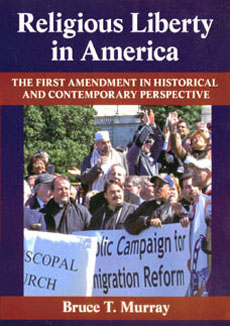Immigration and Civil Religion
Debate casts light on Americans’ deepest-held values and conception of national meaning
By Bruce T. Murray
Author, Religious Liberty in America: The First Amendment in Historical and Contemporary Perspective
The ongoing immigration debate raises core questions about what it means to be American – and who is not American. The issue is often cast in ugly terms: On one side, some argue that the nation’s current crop of immigrants – mostly from Mexico, Latin America and Asia – are too numerous and too “different” to assimilate into American culture. On the other side, many argue that the immigrants of today are no different from the immigrants of the turn of the last century, who eventually assimilated into mainstream American society.
The debate has cast light on an obscure but pervasive phenomenon in America known as civil religion – a belief system that binds the nation’s deepest-held values with transcendent meaning. The term civil religion is not widely used, but the language of civil religion is familiar to most Americans. For example, during the 2008 presidential campaign, Barack Obama frequently invoked civil religion. In his first debate with Sen. John McCain, Obama pledged to “restore that sense that America is that shining beacon on a hill.” Obama’s imagery might strike a familiar chord with those who remember Ronald Reagan’s speeches and radio addresses. Reagan often spoke of “a shining city on a hill”; and indeed, in many ways Reagan defined his presidency on this single image. (See more on civil religion here.)
The promise of the “shining city on a hill” has beckoned generations of immigrants to America’s shores in search of both spiritual renewal and earthly fortune. But who is chosen for admission – and who is not – prompts starkly different interpretations of America’s national purpose and responsibility. Civil religion is an underlying component in the debate: Many Americans feel their national creed (a term sometimes used in place of civil religion) is threatened, disrespected or diluted by the newcomers. Proponents of immigration point out that past generations of immigrants have thoroughly assimilated and adopted American values – and indeed have become their greatest proponents.
California Gov. Arnold Schwarzenegger, himself an immigrant from Austria, noted the importance of values – the constituent elements of civil religion – in American civic life.
“Immigration is about our values. Above all, we owe it to our country and our immigrants to share our values. We should talk about our history, our institutions and our beliefs,” Schwarzenegger wrote in a column for the Los Angeles Times. “As a river gains strength and momentum from joining waters, so America is blessed and enriched by new people and new energy. But we still need a new immigration law to properly channel the flow.”

The connection between civil religion and immigration is further explored in the University of Massachusetts Press book, Religious Liberty in America: The First Amendment in Historical and Contemporary Perspective by Bruce T. Murray.
“This book includes an especially engaging and in-depth chapter on American civil religion. This chapter relies upon the scholarly work of Robert Bellah, among others, even as it traces American civil religion from John Winthrop’s (and Ronald Reagan’s) ‘city upon a hill’ to contemporary disputes over immigration, the ‘culture wars,’ and the religious rhetoric of Bush and other political leaders.”
— Daniel O. Conkle, Professor of Law and Adjunct Professor of Religious Studies, Indiana University (from the July, 2009 issue of the Catholic Historical Review)
Religious Liberty in America is available at numerous university libraries and the University of Massachusetts Press.
Book review critical of Murray's treatment of civil religion and immigration:
“In an otherwise provocative discussion of civil religion, Murray somewhat confusingly uses recent Latino immigration activism to illustrate tensions over faith and belonging. Ultimately, Murray frames this debate between two polar opposites, whether Latino immigration ‘threatens the United States' cultural and political integrity’ (quoting Samuel Huntington) or whether Latinos have ‘appropriated American values and civil religion in the spirit of Martin Luther King’ (quoting Luis D. León) (p. 63). One wonders if the question is such an either/or proposition.”
— David A. Reichard, California State University Monterey Bay, The History Teacher, February 2009
See more reviews here, and criticism here.
Further reading
Americanization in the 21st century
Zócalo panel takes on immigration policy and philosophy. Panelists include USC demographer Dowell Myers, Alfonso Aguilar of the U.S. Office of Citizenship, and José Luis Gutiérrez of the Illinois Office of New Americans.
Immigration policy, politics and economics
Judy Gans, Director of the University of Arizona’s Immigration Program, notes that although the numbers of immigrants today is higher than ever in U.S. history, the immigrant population as a percentage of the overall U.S. population is actually lower now than it was at the turn of the last century. “I think we’ve been here as a country before ... There is more concern about immigrant incorporation than there needs to be,” Gans said.
Dealing with the trade-offs of immigration policy
Dowell Myers, a demographer at USC, said that as the baby boom generation retires, the younger generation of immigrant workers will be necessary to fund their retirement. “Immigrants and their children have a role to play. We need to invest in them big time,” Myers said.
News updates
Annotated links to immigration-related news stories.


